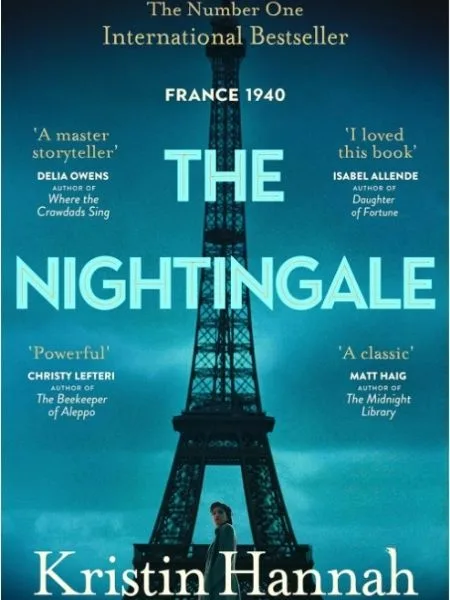Amidst the expansive realm of historical narratives, certain literary creations surpass the confines of temporal boundaries, enrapturing readers with chronicles that resonate across successive eras. Kristin Hannah’s magnum opus, “The Nightingale,” undoubtedly falls within this distinguished category. Originating in 2015, this literary gem intricately unfolds a poignant tale against the tapestry of World War II, delving into the profound themes of selflessness, tenacity, and the unconquerable fortitude embodied by women.
Kristin Hannah:
Before delving into the intricacies of “The Nightingale,” it’s essential to understand the author behind this emotionally charged tale. Kristin Hannah, born in September 1960, is an acclaimed American author with a diverse literary portfolio. With over 20 novels to her name, she has proven her prowess in crafting compelling stories that resonate with readers. Known for her ability to delve into the human condition, Hannah’s works often explore complex relationships and the transformative power of love.

"The Nightingale" Story Goes On:
“The Nightingale” opens in contemporary Oregon, with an elderly woman reflecting on her past. This woman is revealed to be one of the sisters, now living a quiet life. The story then flashes back to the 1930s and introduces us to the young Vianne and Isabelle, whose lives take divergent paths due to their differing personalities and circumstances.
As war breaks out, Vianne, the elder sister, remains in the small village of Carriveau with her husband, Antoine, while Isabelle, rebellious and spirited, joins the French Resistance in an effort to fight against the German occupation. The novel skillfully alternates between the perspectives of the two sisters, providing a nuanced and comprehensive view of their experiences during the war.
Vianne, initially portrayed as the more traditional and cautious of the two, is forced to confront the harsh realities of war when German soldiers occupy her home. Through her perspective, readers witness the everyday struggles of civilians trying to maintain a semblance of normalcy while living under the oppressive regime. Vianne’s journey becomes a testament to the resilience of women thrust into impossible situations and their ability to adapt, survive, and even resist in their own quiet ways.
Isabelle, on the other hand, embraces a more active role in the resistance. Adopting the codename “The Nightingale,” she becomes involved in smuggling downed Allied airmen across the Pyrenees Mountains to safety. Isabelle’s character embodies the spirit of defiance and courage that defined many women who fought against the Nazis. The novel sheds light on the often-overlooked role of women in the resistance movements, showcasing their bravery and resourcefulness.
Characters:
Vianne Mauriac: Vianne, the elder sister, epitomizes resilience in the face of adversity. Her character arc reflects the struggles of countless women during wartime, torn between loyalty to family and the instinct for self-preservation. Vianne’s evolution from a quiet, obedient wife to a formidable force of resistance is a testament to the transformative power of love and sacrifice.
Isabelle Rossignol: Isabelle, the younger sister, embodies the spirit of rebellion and courage. Her journey as a member of the French Resistance is a gripping exploration of the sacrifices individuals make for the greater good. Isabelle’s character challenges traditional gender roles, showcasing the strength and tenacity of women in the face of immense challenges.
Other Supporting Characters: Hannah’s skill lies not only in portraying the main characters but also in crafting a rich ensemble of supporting figures. Each character contributes to the narrative, offering unique perspectives on the human experience during wartime.
Themes of Sacrifice and Resilience
At its core, “The Nightingale” is a narrative of sacrifice and resilience. Both sisters make significant sacrifices, albeit in different ways. Vianne sacrifices her comfort, safety, and even her principles to protect her family and survive the war. Isabelle sacrifices her personal safety and well-being for the larger cause of freedom and resistance. The novel delves into the complexities of these sacrifices, exploring the moral dilemmas faced by individuals in times of war.
The theme of resilience is interwoven throughout the narrative, embodied by the two sisters who face unimaginable challenges. Vianne’s resilience is quiet and steadfast, grounded in the determination to protect her daughter and survive the war’s brutality. Isabelle’s resilience is fiery and rebellious, fueled by a deep-seated desire to defy the oppressors and contribute to the fight for a free France.
Hannah skillfully explores the impact of war on individuals, families, and communities, emphasizing the strength that emerges in the face of adversity. The novel invites readers to contemplate the human capacity for endurance and the choices individuals make when confronted with the darkest aspects of humanity.
Author Writing Style:
Kristin Hannah’s writing style in “The Nightingale” is both evocative and immersive. She employs vivid descriptions that transport readers to the picturesque landscapes of France and the harsh realities of war. The narrative is emotionally charged, tapping into the raw emotions of love, loss, and the unbreakable bonds between family members. Hannah’s prose is fluid, making it easy for readers to become deeply invested in the characters and their fates.
Critical Reception and Awards:
“The Nightingale” received widespread critical acclaim and numerous accolades, solidifying its place as a significant work of historical fiction. Readers and critics alike praised the novel for its compelling storytelling, well-developed characters, and emotional depth. The novel’s exploration of the female experience during wartime struck a chord with many, garnering a large and dedicated readership.
Among its accolades, “The Nightingale” was a New York Times bestseller, and it received the Goodreads Choice Award for Historical Fiction in 2015. The novel’s success underscores the universal appeal of its themes—love, sacrifice, and the resilience of the human spirit—and its ability to resonate with readers across diverse backgrounds.
Adoption:
“The Nightingale” has garnered widespread acclaim and has become a staple in book clubs and educational curricula. Its adoption in various settings is a testament to the novel’s universal themes and its ability to resonate with diverse audiences. The exploration of sisterhood, resilience, and the untold stories of women during wartime provides ample material for discussions on history, gender roles, and the human capacity for heroism.
Takeaway:
“The Nightingale” sheds light on the often-overlooked contributions of women during wartime. It serves as a powerful reminder of their strength, resilience, and the pivotal roles they played in shaping history.
The novel delves into the intricate dynamics of familial bonds, showcasing how relationships evolve under the duress of war. It prompts readers to reflect on the complexities of love, loyalty, and sacrifice.
The characters’ unwavering courage in the face of adversity serves as an inspiration. “The Nightingale” prompts readers to contemplate the extent of their own resilience and the choices they would make when confronted with extraordinary circumstances.
In the realm of historical fiction, “The Nightingale” stands as a beacon, illuminating the untold stories of women in wartime and celebrating the indomitable spirit of the human soul. Kristin Hannah’s narrative prowess, coupled with the compelling characters and the exploration of universal themes, ensures that this novel will continue to resonate with readers for generations to come. As we close the pages of “The Nightingale,” the echoes of sacrifice and resilience linger, reminding us that, even in the darkest of times, the human spirit can soar like a nightingale’s song.

